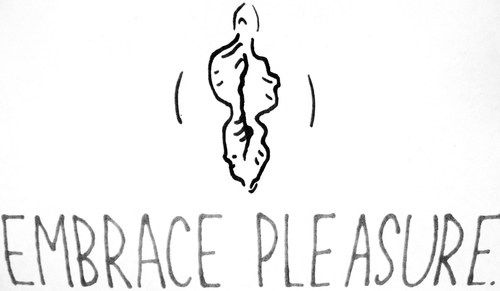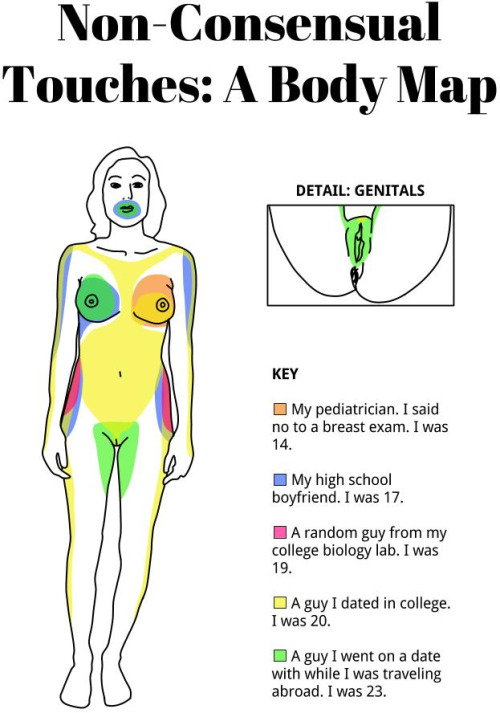The Story Behind “Embrace Pleasure”9/23/2015 Is sex dirty? Is enjoying sex a bad thing? Is it only okay if you always do it with the same person? Or if you’ve made a forever commitment with them?
Why do we have so many restrictions on our sexual enjoyment? What are we afraid might happen if we embrace sexual pleasure? One survivor’s reflections:
Sometimes I try to imagine what it would be like to live in a body that wasn’t repeatedly touched, fondled, and/or used without my consent. My relationship to my body has been shaped by all these experiences of people touching me against my will, since I was a kid. When I was raped at age 23, it felt weirdly unsurprising and familiar because I had experienced so much non-consensual sexual touching in my life already. I decided to make a map of my body that shows where people have touched me against my will. Why do I want to share this with the world? 1. To say, “Hey! This is what sexual assault looks like (or can look like). Recognize it! Acknowledge it!” 2. To share what has happened to me as a part of my own healing process. 3. To bring attention to the complex, confusing, and deeply internalized ways that non-consensual touching can affect a person. I am trying to reclaim my body as my own – to unlearn all of the experiences that have taught me that my body exists for other people’s whims, and to proclaim that I am the ruler of my body – the only person who gets to decide what I do with it. I have bodily autonomy and I will not give it up! One survivor’s thoughts after a rape. Names have been changed.
Dear James, I’m writing you to share my feelings about our interactions in the past couple of weeks. Some of your actions have been hurtful to me, and I thought that maybe if I put my thoughts into writing, you might be able to see where I’m coming from. When you came up to me for the first time in the market, I assumed that your interest in me was based on my body, including my whiteness. That was fine with me – my body is a part of who I am and I enjoy when people enjoy it. I wasn’t looking for anything serious, and I was totally cool with enjoying each other’s bodies, as long as I felt safe and my boundaries were respected. I had a lot of fun cuddling with you. I was really missing touching someone and being touched. You were very sexy and it felt good. But I was clear about the fact that I wasn’t comfortable with kissing you or doing anything more than cuddling. I told you that crossing that line could ruin my relationship with my boyfriend, and how sad that would make me. I wasn’t sure whether or not you enjoyed cuddling without having sex, and I didn’t want us to be doing something that was only fun for me, so I asked you. You said you liked it. I was excited to go to the bar with you, and I had a good time there. Your friends were nice and I had fun talking to them. I accidentally got drunk (I know it’s weird, but I’m sensitive to alcohol and two drinks is a lot for me) to the point where my eyes kept closing and I felt like I needed to lean against something to stay upright. I assume you noticed how drunk I was, because I’m not subtle. I also told you, “I’m really drunk; I’m trying to slow down.” This was around the time that we went to the jungle gym and you kept trying to kiss me. I kept avoiding you, but I still liked being close to you, so I didn’t move away completely. Eventually, I was too slow and you caught my lips with yours. I didn’t kiss you back at first. I think I was making it pretty clear that I didn’t want to kiss you, by telling you and avoiding your kisses. At your house, I repeatedly moved your hand away from my vagina while we were kissing and cuddling. At some point you started fingering me and I said, “No, no, stop, please don’t, let’s not do this, no” etc. until you stopped. I think you could see that I was upset by this, because when I tried to sleep on the couch, you asked me if I was okay. You eventually convinced me to come back to bed by promising over and over again that you wouldn’t go inside me again. I trusted you when you said this. Then you insisted that I let you rub your penis on my vagina. I told you that I wasn’t comfortable with that. I don’t understand why you didn’t care about whether or not I was comfortable with the things you wanted to do with my body. You promised again that you wouldn’t go inside me. Eventually I let you rub yourself on me because I wanted you to fall asleep so I could be alone, since the situation was making me uncomfortable. Your rubbed your penis against me for a little bit, and then started fucking me. Again I said, “No, no, I don’t want this, stop, let’s not do this, please stop” etc. You didn’t stop until you came. I know that you didn’t use violence against me, you didn’t force me to go to your house, you didn’t hold me down. But you did completely disregard the fact that I didn’t want to have sex with you. You ignored me when I said no. If you have sex with someone when they say no, that is rape. It can be traumatic even if it isn’t violent. I’m asking you to please be considerate of what a woman wants when you want to have sex with her. If she doesn’t want to, please stop there. Sex should be pleasurable for everyone involved. I feel violated and disrespected by the way you treated me. I am only writing you to ask you to think about the way that you treated me, and whether or not that is how you want to treat women in the future. I am not interested in contacting the police or anything like that. I don’t trust the criminal justice system and I think it often makes people worse off. I’m leaving for the US tonight and you’ll never see me again. If there is anything you want to say to me, you can contact me at [email address]. With hope, Megan Emma started her internship at Pleasure Pie only a little over week ago and has already done so much.
Emma helps to keep Pleasure Pie connected to you by:
My favorite things about working with Emma so far:
-Nicole Mazzeo, Pleasure Pie founder and director *** Q&A with Emma! Emma Glassman-Hughes: Hi everybody! I’m Emma, the new Pleasure Pie intern, and I’m very eager to introduce myself to this community. As a way for you to get to know me, as well as my place in the world of sex positivity, I’m going to answer some questions for you. Nicole Mazzeo: So Emma, why is sex positivity important to you? EGH: Though I’m an Atheist by mentality and a Jew by heritage and sense of humor, my family still celebrates Christmas for the hell of it. My gift this year from my dad, fully embracing my burgeoning feminist pride, was a book called The Secret History of Wonder Woman by Jill Lapore, which highlights one of America’s most beloved superheroes, while masterfully weaving in the comic’s shining feminist subplot. Though I’m not yet finished with all 300+ pages, I was struck by the introduction of the wife of William Marston, Wonder Woman’s creator, named Sadie Elizabeth Holloway. She was supposedly very independent and an avid reader of the ancient Greek poet Sappho, a feminist of her time who is described in the book as “the symbol of female love.” Holloway was deeply inspired by Sappho, this feminist symbol, and it is speculated that Wonder Woman is inspired by Holloway. Thus, by my calculations, Wonder Woman is, by association, a superhero whose true super power is the power of female love. To me, this proved very important. I had never thought of my love—my sex, my friendship, my passion—as a power before. So I suppose I would say that sex positivity is important to me because it helps me see the power in owning my sexuality, and it reminds me that sex is more than something that society simply expects for me to give; my sex is my autonomy. I’ve always had trouble embracing my own sexuality to its fullest potential—learning to effectively communicate with partners, let go of self-consciousness, and separate myself from sexual shame are just a few of the things I have had to work toward. And, while that struggle is far from won, my continued learning about sex positivity has helped unwrap the happier, healthier, and more self-aware woman that was hiding under layers of limiting societal pressures. The power behind female love is a more extraordinary phenomenon than we are taught to believe in school (my third-of-a-year-long high school sex [read: abstinence] education was, needless to say, a letdown), and I am thankful for sex positivity and for Wonder Woman for showing this to me. NM: What’s your take on intersectional activism? EGH: As a feminist, one of the most interesting things about keeping up with media coverage in times of nationally heightened racial tensions (such as the recent uproar about how police brutality disproportionately affects black victims) is hearing black activists talk about black men the same way that feminists talk about women. I hear so many of the same buzzwords, like “victim-blaming,” and it becomes difficult for me to see a separation between the two issues. Racial injustice and gender injustice are inextricably tied, and you simply cannot have true feminism without an anti-racism component. It is also important that sex positivity in particular embraces intersectionality (I hope this is a word because I like it) and specifically tackles racial injustices because the sexuality of people of color has historically been controlled, commodified, and exploited in this country. Though racism is often at the forefront of my thinking due to its growing coverage on different forms of media, people who face other kinds of oppression also need feminist advocates. Because I grew up in Southern California, an area with some of the country’s largest homeless populations, as well as a very close proximity to the Mexican border, I began thinking about class and immigration issues at a young age. Disadvantages in people’s lives can lead to unhealthy views of sex, which contributes to the anemic and destructive overarching sex culture in our country. People of every background deserve to be knowledgeable about sex, to love their bodies, and to know how to give and ask for consent. People of every background deserve to feel safe and free from sexual violence. People of every background deserve to know how to make themselves happy. Eradicating the oppression of all people is the real business of feminism, empowering those who have historically been silenced will lead us all to a better future. Intersectional activism, to me, is the only activism worth pursuing because it unites diverse voices in order to more effectively create change. NM: What do you want to accomplish by doing this internship? EGH: Not only am I a fabulous Pleasure Pie intern, but I am also a fabulous college student and young woman with a lot on my mind. As much as I would love for these things to not belong in the same sentence or even the same blog post, as a female student, I am constantly reminded of rape culture. Need I even mention the obscene statistic that approximately 1 in 5 female college students will be sexually assaulted before she graduates? People of all sorts and genders (yes, this includes men *gasp*) suffer in a society that refuses to promote healthy sexuality and instead fosters sexual violence. I would love to live in a world where people can come into their own sexualities free from fear, judgment, entitlement, and shame. This sexual utopia can be achieved, I am convinced, if we improve the conversations that we are having about sex, and if we embrace a healthier and more informative sex education curriculum that covers all kinds of varying sexualities, gender identities, and contraceptive choices, which is a lot of what sex positivity is about. As a sex positive intern, I would love to learn new ways to make this topic more accessible for a variety of people with different backgrounds, to help eradicate rape culture, to work to improve sex education in schools, and to do my best to create a more accepting and all-inclusive sex culture through productive and forward-thinking conversation. Working for Pleasure Pie is my way of entering this conversation with purpose, and, of course, a wealth of nifty zines to guide me through it. As a teenager, I was really confused about the concept of a “tease.” I heard some of my male peers say, more or less, that teases were the worst and they hated them. I weeded out from their comments that the basic definition of a tease was a girl who fooled around with a guy, but didn’t have sex with him. Wait, did that mean I was a tease? I would often have long, steamy make out sessions with whichever lucky guy was my boyfriend at any given moment (wink), and these make out sessions would never turn into sex. It wasn’t necessarily that I didn’t want to have sex with these guys, it was that they never initiated sex (and at the time I felt that, as a female, it wasn’t my place to initiate it). When I heard my guy friends lamenting the existence of “teases,” I started to worry that all this making out with no sex might make guys hate me (my worst nightmare as a boy-crazy teenage girl*). To add to my confusion, the things I heard about sex weren’t lining up with what was happening in my own sexual experiences. Here’s a brief sampling of the messages about sex I received from the media, adults, and peers (with commentary):
If guys only care about sex, and don’t value relationships or foreplay, why weren’t my boyfriends trying to have sex with me**? They all seemed to be in less of a rush to get to sex than I was, and I was (according to what I had noticed people expected of me as a female) the one who was supposed to be in charge of withholding sex until an appropriate time. But wait, doesn’t withholding sex make me a tease? And doesn’t having sex as soon as a guy wants to make me a slut? So many conflicting messages! Let me set some things straight. Guys care about more than just sex. To my surprise, the guys I dated appeared to have feelings about sex other than Must Have Sex ASAP — feelings that probably included wanting to feel ready, caring about not making me uncomfortable, wanting to live up to their religious beliefs and family’s standards (which sometimes told them to wait until marriage), being nervous about how to initiate sex, how to know what I wanted, and how to have good sex, and even (get this!) enjoying our lengthy make out sessions. And those were just their feelings about sex. They also had all sorts of other feelings about all sorts of other things, unrelated to sex. They were at times sentimental, shy, creative, caring, romantic, anxious, etc. They wrote songs, loved their pets, tried to help me through my issues, cared about school, cared about our relationship — all the cares and concerns any multifaceted person might have. These guys, while their brains might have been flooded with hormones and they might have been thinking about sex much of the time, also had real thoughts, feelings, and priorities other than “Must deflower girlfriend NOW.” Guys don’t always want sex. I know what you’re thinking: “But every sitcom I’ve ever watched has told me otherwise!” These sitcoms are exaggerating. While many men want to have sex frequently, many others prefer occasional sex or no sex at all. Even the men who crave sex frequently have plenty of moments when they’re, say, stressed about work, on the phone with their mom, or really into a good movie. I’ve tried to initiate sex in these moments. It was through being rejected that I learned that these moments of preferring not to have sex exist. Girls and women sometimes do want sex. Why else would lesbians have sex? This also applies to straight and bi+ girls and women, many of whom want to have sex more often than their male partners do. It is perfectly okay for a person of any gender to want to have sex very frequently, or never at all. Which brings me to my next point… Not wanting to have sex is always okay. While our culture teaches that sex is dirty and secret, it is also widely believed that a lack of desire for sex (especially in the context of a committed relationship) means that something’s wrong, either with the individual or with the relationship. This is often not the case! Many people’s sex drives naturally fluctuate. Many others prefer never to have sex. This doesn’t mean that they don’t experience love, intimacy, joy, satisfaction, relaxation, or any other emotion. Gender roles and rape culture Our culture teaches guys that they’re supposed to keep pushing to get as far as they can in any sexual encounter. We also teach girls and women that they’re supposed to say no a certain number of times before “giving in” to sex, because being hesitant makes you less “slutty.” Because of these teachings, when a girl/woman says no to sex with a guy:
And what happens when a guy is sexually assaulted? People’s responses tend to line up with the dominant cultural teachings about guys and sex:
What about when a woman is sexually assaulted by another woman? Again, cultural understandings of gender tend to add to this problem. Many people don’t take it as seriously as sexual assault perpetrated by a male because we’ve been taught that women don’t have the same capacity for violence and aggression as men do. This leads to many survivors not getting the support they need to address the emotional effects of the assault. As a culture, our dominant messages about sex should include that:
The psychological effects of gender roles The simplistic and often unrealistic messages our society teaches about what to expect from girls/women and guys/men have clearly caused me a lot of unnecessary confusion, but the negative effects of this misinformation don’t end there. For instance, a rigid view of gender roles tends to go along with lower self esteem and prevents people from expressing themselves fully. Many people feel stuck expressing their gender in a way that fits with their gender role in order to gain approval from a partner, or from society in gen(d)eral. This leads to less sexual satisfaction in relationships and more sexual repression. Transgender people and gender roles While rejecting gender roles can be hard for anyone, it may be especially difficult for many transgender people who, already marginalized for their gender identity, are more likely to face harsh discrimination and even violence for challenging cultural norms. Though many trans people adhere to gender roles in their relationships, buying into the idea of gender roles tends to go along with higher levels of internalized transphobia. It isn’t uncommon for a trans person to feel afraid of talking with their partner about their trans identity, or to prefer sex in the dark so their bodies are less visible to their partners. If we, as a society, had a more fluid understanding of gender, less common gender expressions wouldn’t be seen as such a problem.
On “teases”
I wasn’t a “tease” for having dozens of make out sessions that didn’t end in sex. Why?
The whole concept of a tease is unhelpful and often inaccurate. It’s tied to the male pushing, female withholding model of sexual progression, which can be harmful in heterosexual encounters and fails to acknowledge same sex encounters. The idea of a tease wouldn’t be so prevalent in a world where sexual activity is thought of as something people engage in and move forward with together for their mutual enjoyment. *Not all teenage girls are boy-crazy, but I was. **Shout out to all my teenage boyfriends, now in your mid 20s: Thanks for not getting me pregnant, xoxo. This article was written by Nicole Mazzeo for Fabulously Feminist Magazine. |
|
Get Pleasure Pie Emails!
(not to be confused with Boston's Sex-Positive newsletter)
|
search the site
|
hello@pleasurepie.org




